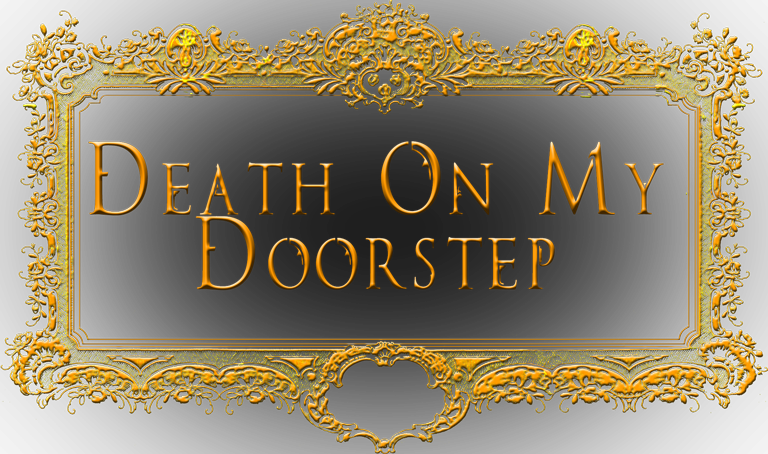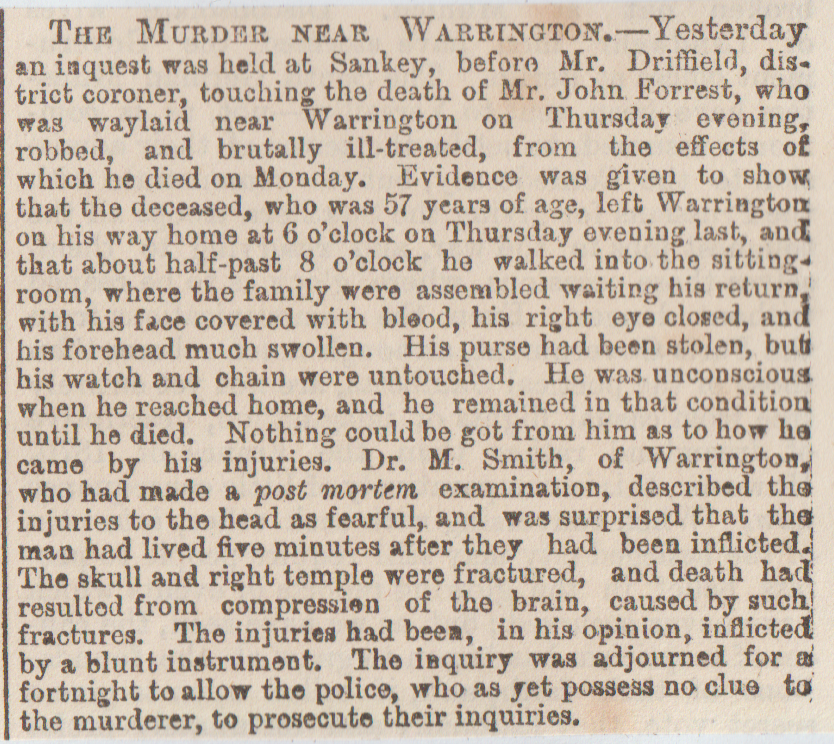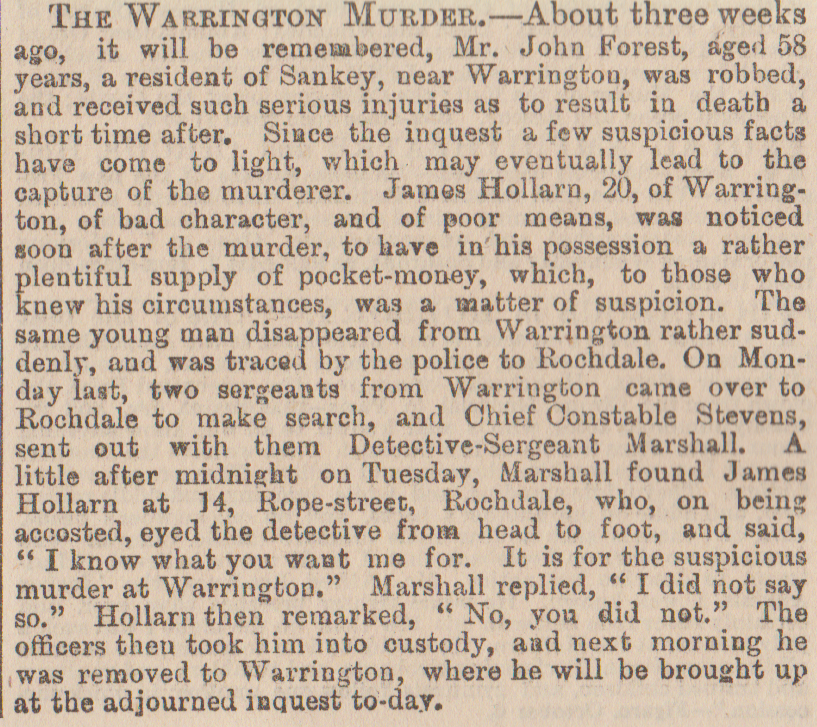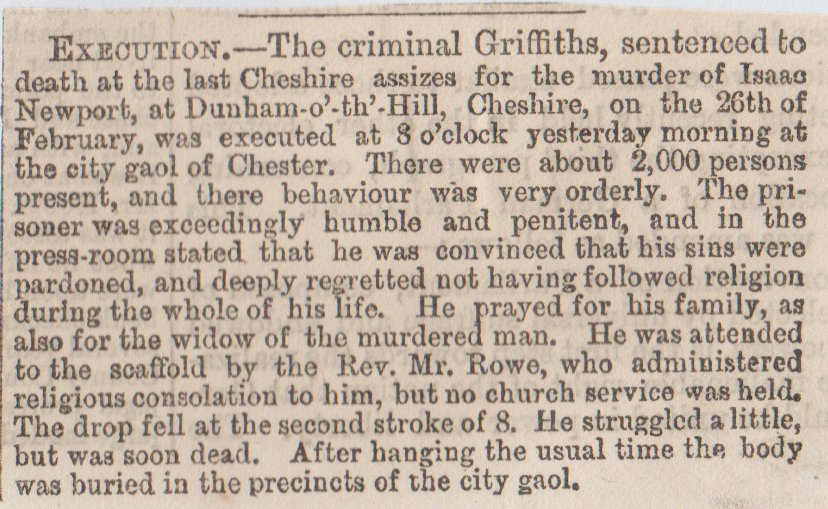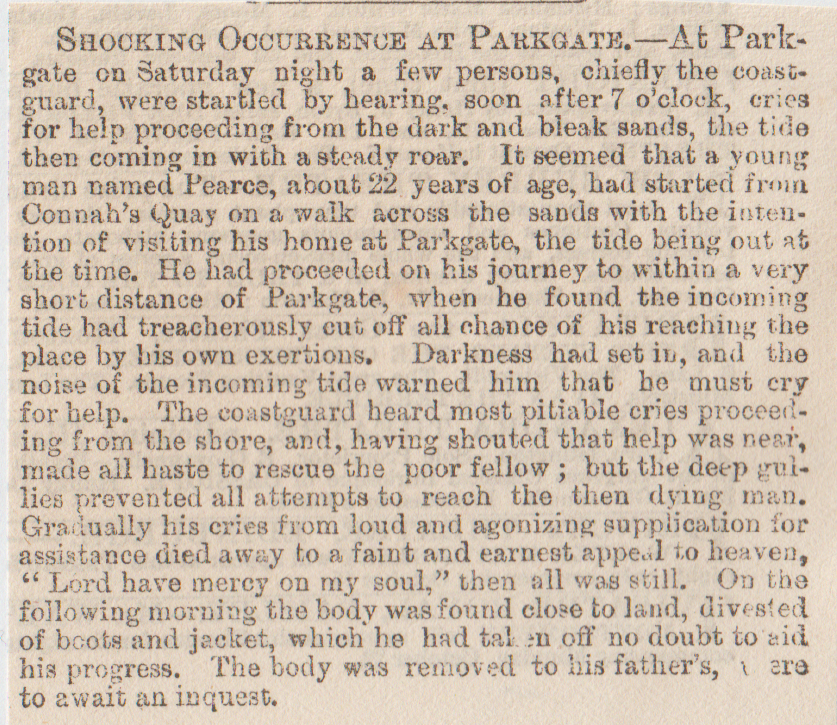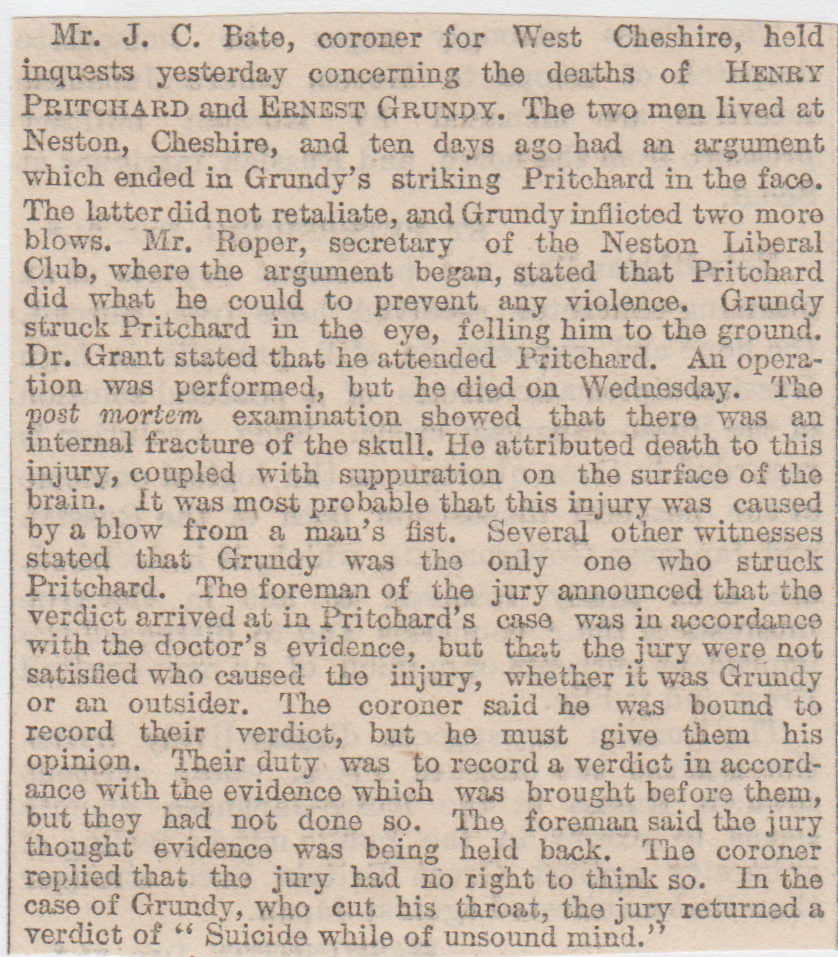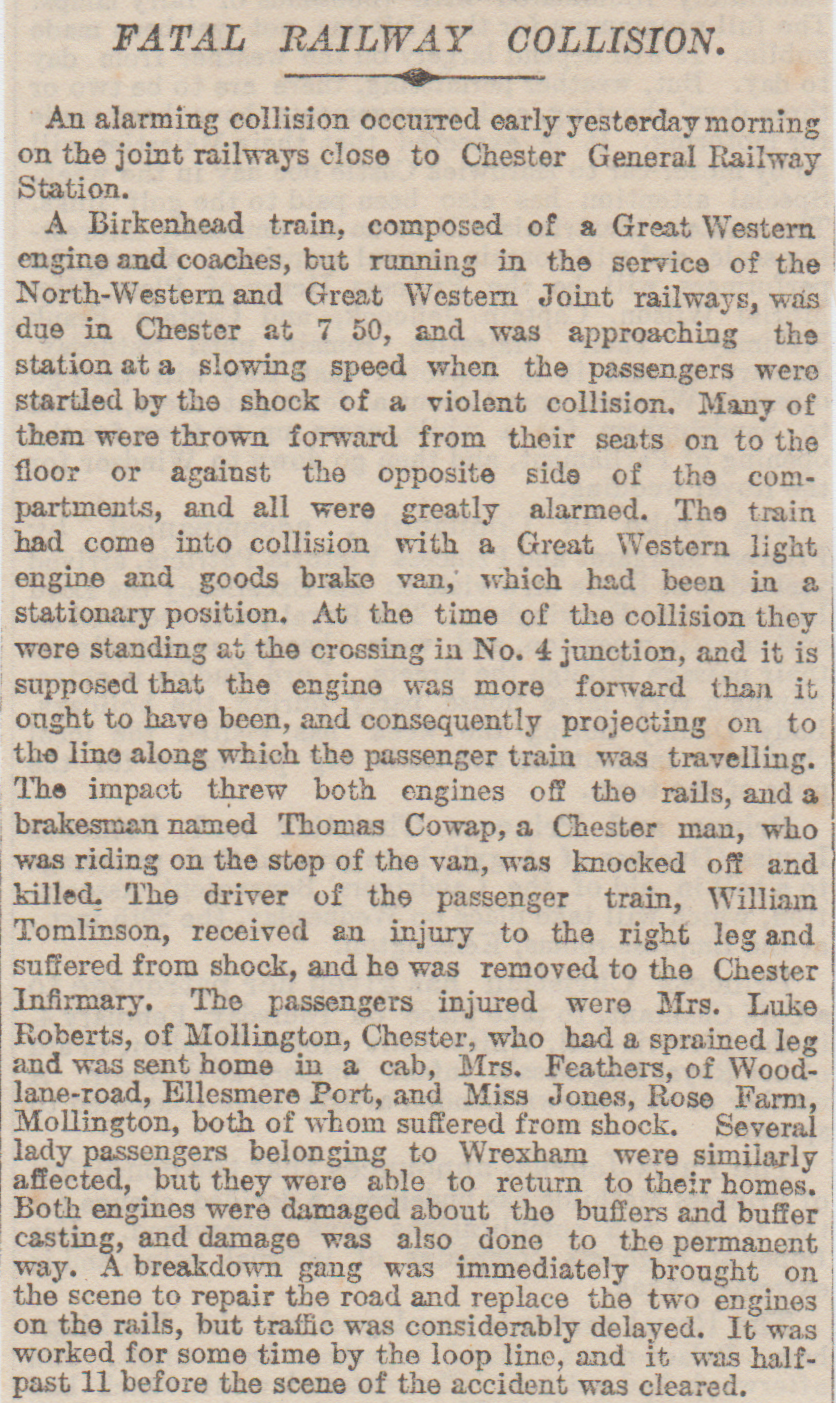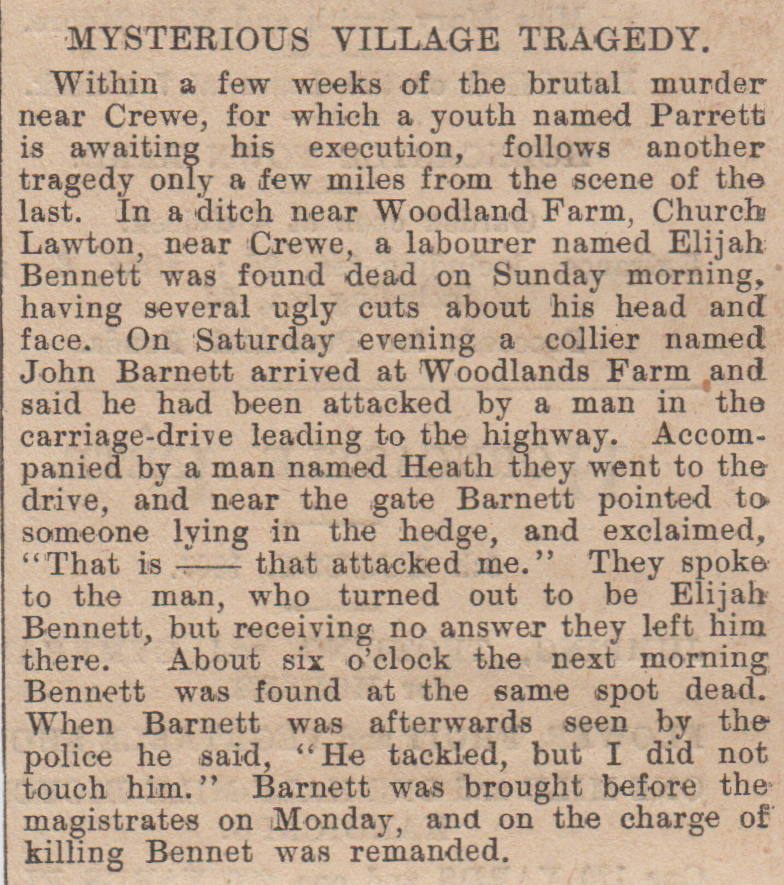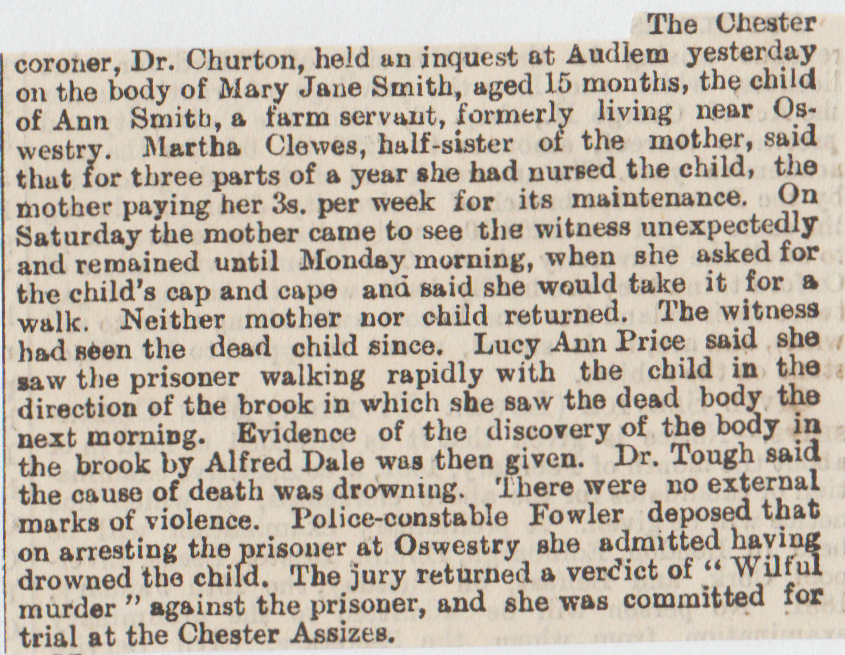1/ Newton Hall, Chester, March 1879 (Butler Suicide)
27-year-old butler to Mrs Peace of Newton Hall, William Smith, got drunk and tied a piece of string around the trigger, placed his foot in the loop and fired, distributing his face and brain over the walls of the room. Jury’s verdict was “Temporary Insanity”.
2/ Chester Castle (Soldier Suicide) June 1909
Colour sergeant Arthur Longley aged thirty-seven placed the barrel of a rifle in his mouth with a piece of wire attached to the trigger and killed himself. He was a member of the Cheshire Regiment and was due to leave the Castle the day before. He was in the armoury at the time of death. Longley also leaves a wife and kids behind and also illness was rife in the family with two kids in isolation hospital. Reason for death?
3/ Grosvenor Hotel Suicide, Chester, June 1897
28-year-old travelling cement salesman from Liverpool, Reginald Dale, booked into the Grosvenor Hotel and stayed there for a week or so. One of the hotel staff entered his room and found him slumped unconscious. A doctor was swiftly found and managed to revive the fellow. He told the doctor that he’d taken Condy’s Fluid but he found no stains around the mouth that fluid would produce.The doctor doubted his word and sifted around for other evidence of poison and he found a bottle that smelled of chloral (trichloralethanal) The patient took a turn for the worse and died soon after. His boss, Algernon J. Pilkington, stated that he had mortgage problems and was in financial difficulties. “Suicide whilst temporarily insane” was the verdict.
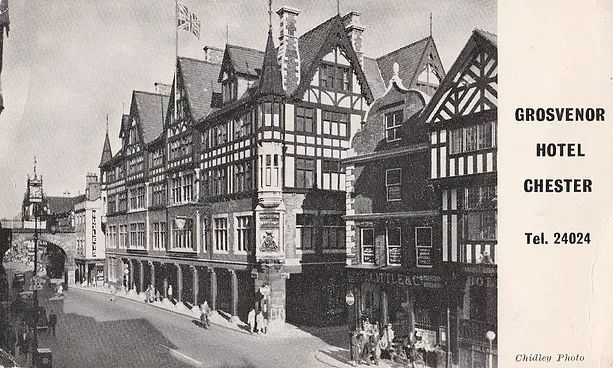
4/ Grosvenor Hotel, Chester, March 1886 (Still there!)
At around eight a.m. one morning, a commercial traveller found a fellow commercial, Mr Frederick Charles Hill, lying on the bedroom floor at the Grosvenor, covered in blood. He had arrived at ten p.m. the previous night, then went to bed an hour later, but he seemed quite calm. He was found naked with razor marks on his arms and a pocket-book, zinc ointment, a prescription, two bottles of medicine, which contained aqua morphia & bromide of potash, which is taken for nervous conditions. The notebook contained the following sentence;-“Goodbye. Love to all. Charley don’t fret. Bank right.” The verdict was “Suicide while temporarily insane”
5/ Macclesfield Murder, February 1881
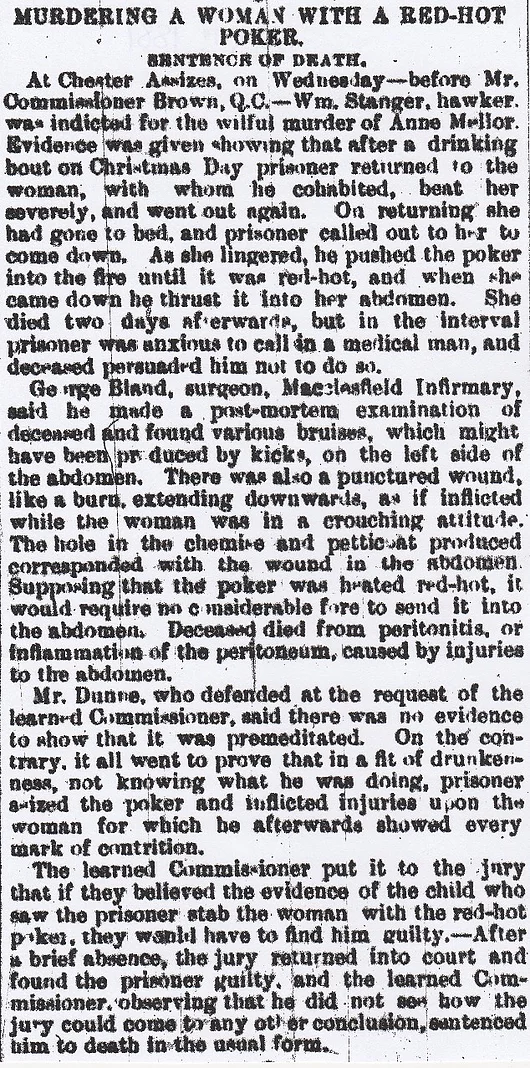
6/ Smallwood near Sandbach, 1883 (Double Murder) I missed the month when I cut out from the paper.
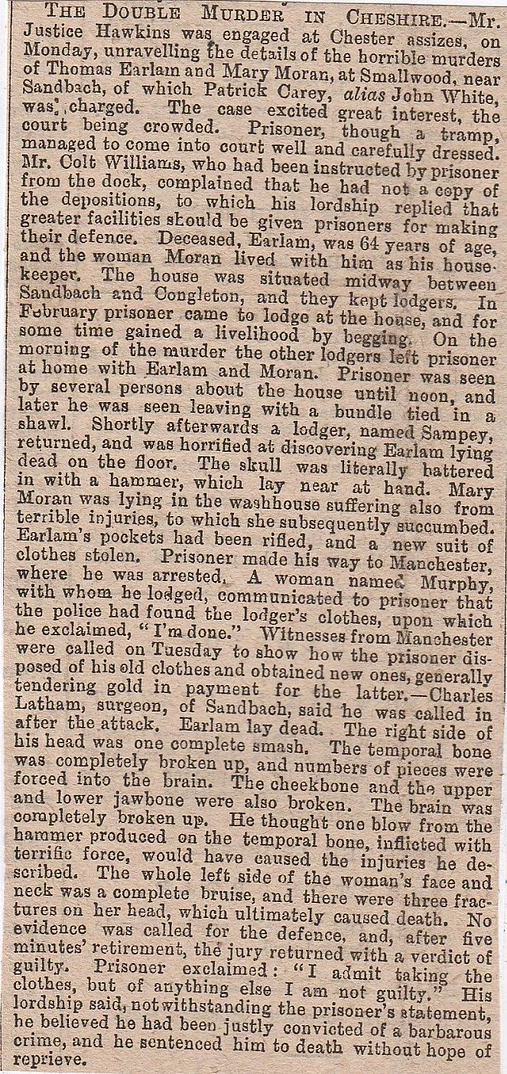
7/ Chester Castle, January 1903 (Soldier’s Suicide)
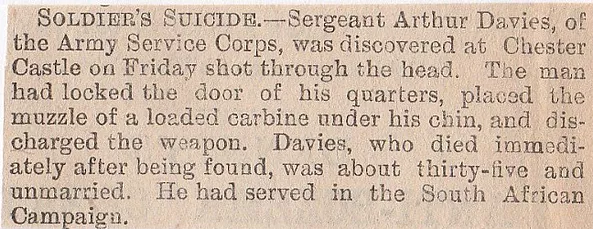
8/ Chester Lunatic Asylum, (Lillie Langtry’s Husband Dead) October 1897
This is the death of Edward Langtry, who was the husband of the famous actress of the day. Lillie Langtry who is most infamous for having an affair with the Prince of Wales, who went on to become Edward VII. Her husband was found at Crewe Station in a dazed state and who later died of his injuries.
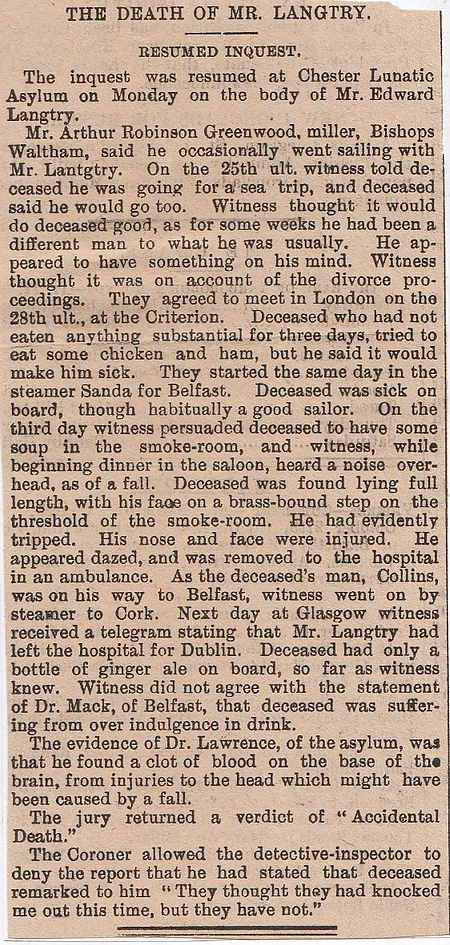
9/ Warrington Cemetery, July 1910 (Died on Daughter’s Grave)
Louisa Cain, the wife of William Cain was found at Warrington Cemetery on her daughter’s grave, having swallowed a quantity of carbolic acid with the bottle being near the body. Her short note expresses her mood exactly: “Dear Louie- I am coming to you at last”.
10/ Lymm, February 1885 (Lymm Giantess)

11/ Wybunbury Murder/Suicide, near Nantwich, July 1835
A terrible event took place in Wybunbury when Thomas Bagguley, who works for Mr Davison (Steward to Sir John Delves Broughton) called upon Mr Davison’s servant girl. Her name was Malpas and she was only sixteen, but his plan was to lure her out and have his way, so he told her that her mother was dying! Malpas ran to see her and Bagguley followed her across the fields where he caught up with her and tried to rape her. She kicked and struggled so he strangled her and left the body in the field. Realising what he’d done he fled back to Mr Davison’s outbuildings and hung himself. The inquest came up the verdict of “Wilful Murder” and “Felo de Se”. His body was buried at the entrance to Wybunbury churchyard at midnight, with a large number of locals to watch the ceremony. Bagguley also left a wife and kids.
12/ Wincham Hall Fatality, February 1885
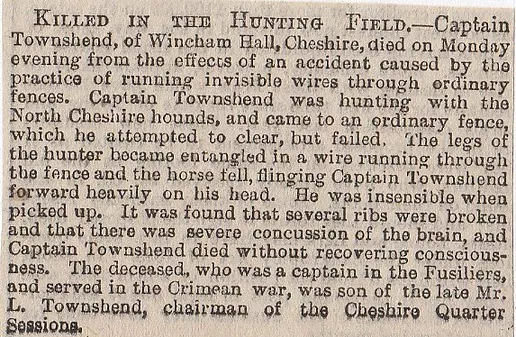
13/ Hartford near Northwich, May 1908 (Double Murder/Suicide)
Mrs Charles Gerrard, who lived in a cottage in Hartford, sent three her children to school on Monday morning as usual. When they returned in the afternoon the door was locked and they couldn’t get in. The door was prized open and Mrs Gerrard lay on the floor with her throat cut and her two little girls aged 2 and 4, were found in a bathtub, both had been drowned by their mother.
14/ Rowton (Lady Disappears) February 1st, 1899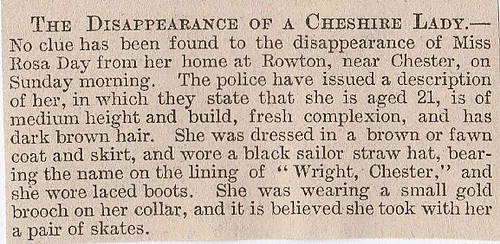
February 4th, 1899
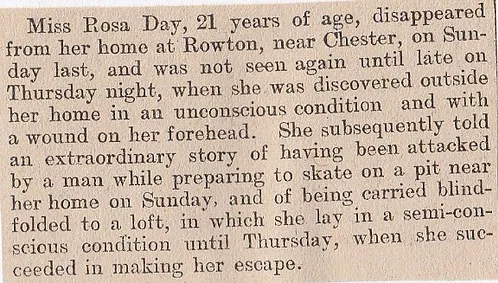
February 6th, 1899 (What Happened Here?)
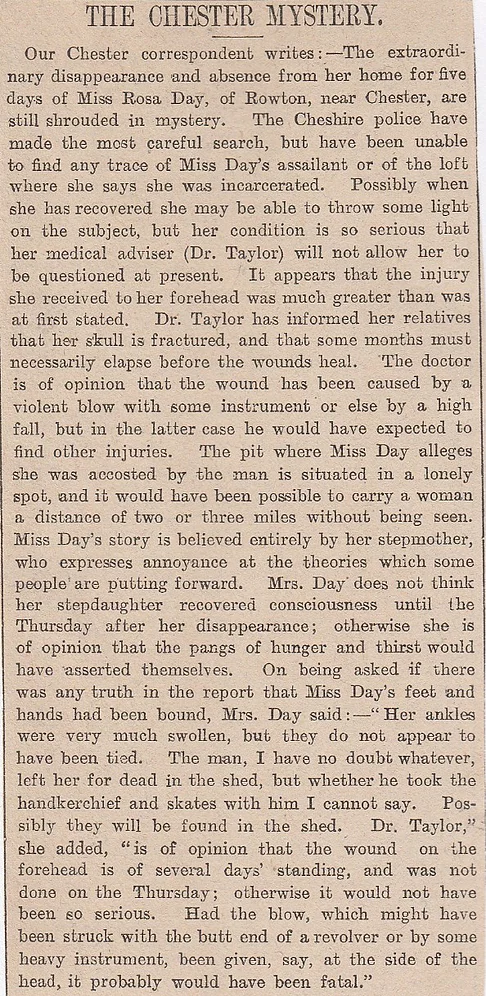
15/ Buglawton, near Congleton September 1835
A 10-year-old boy named Slater worked for Mr Haynes, a silk manufacturer of Buglawton, had a fatal accident at work. He was in the engine-house when somehow his neckerchief became entangled by one of the engine shafts, and despite his screams for help, it was over all too quickly and his head was severed from his body. “Accidental Death” was the verdict.
16/ Stapeley near Nantwich, (Starved to Death) January 1899
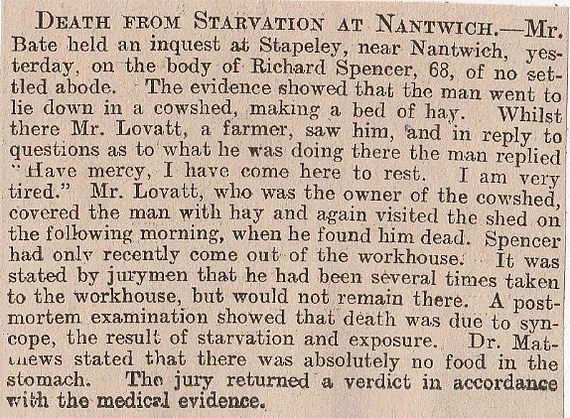
17/ Crewe Station Suicide, July 1869
A man dressed in a black suit, with a dark moustache and beard, was seen at Crewe Station observing the comings and goings of the trains while pacing up and down the platform. The 12-45 from Liverpool was entering the station when he suddenly threw himself in front of it and was instantly killed. The gentleman had been staying at the hotel next to the station, and when they searched his room it turned out he’d got rid of all evidence that would identify him.
18/ Runcorn, February 1899
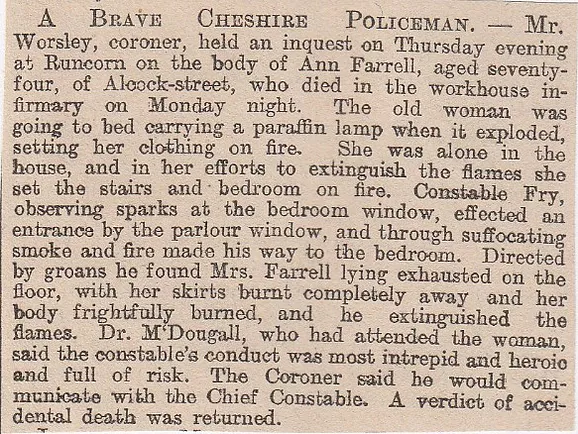
19/ Buglawton Matricide, May 1885
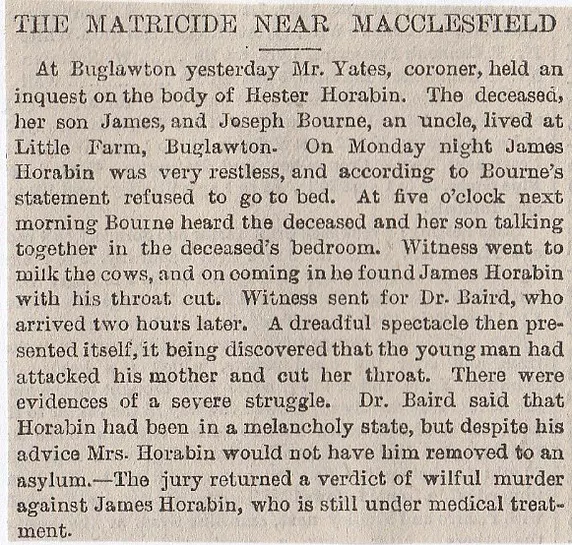
20/ River Dee, Chester, July 1885
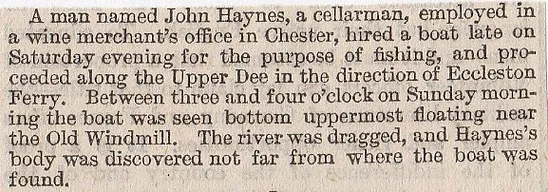
21/ Badeley Vicarage, June 1886 (Vicars Son’s Suicide)
The son of the vicar the Reverend J.Wilkinson Edwards, was a young man of twenty-one, who was employed in an office in Liverpool, went back home to Badeley. He complained to his father that he was over-worked and tired and could he stay with him for a while. He said he could, but one night he left the vicarage to go for a walk and he never returned. His father went out to look for him and saw his son in the grounds with a rifle next to him. He’d put the barrel in his mouth and fired and death was instantaneous. The verdict was “Suicide while of unsound mind”.
22/ Tattenhall near Chester, May 1899 (Lightning Deaths)
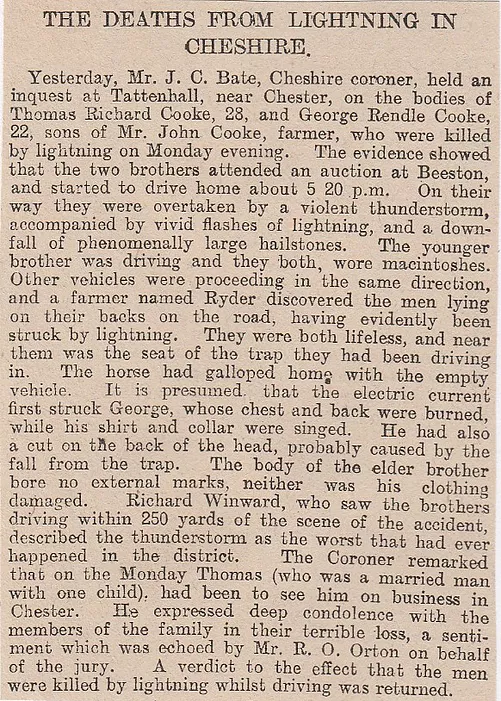
23/ Northwich Drownings, July 1885
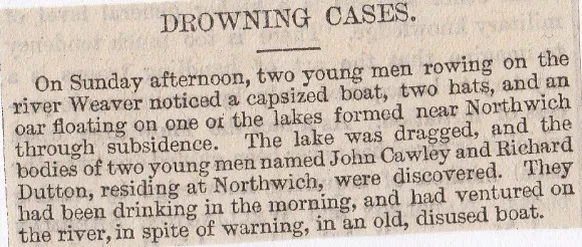
24/ Warrington Fair Death, July 1885

25/ Alsager Hall Suicide, September 1879
The daughter of the owner of Alsager Hall, Mr Bailey, committed suicide by drowning herself in a pool near to the Hall. What caused her to do this is unknown. She was a bridesmaid at her sister’s wedding last week and she was due to be married soon as well. (Is Hall still there?)
26/ Great Budworth, January 1885
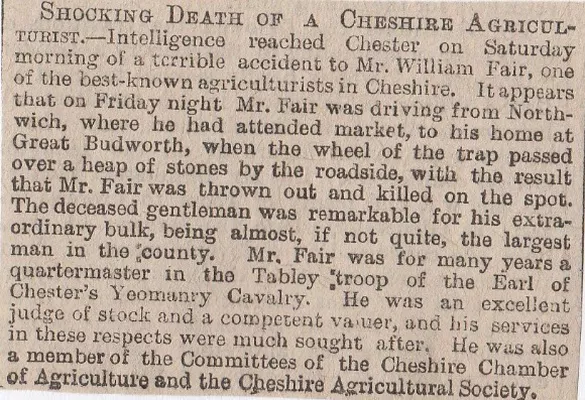
27/ Lymm Drownings, July 1885
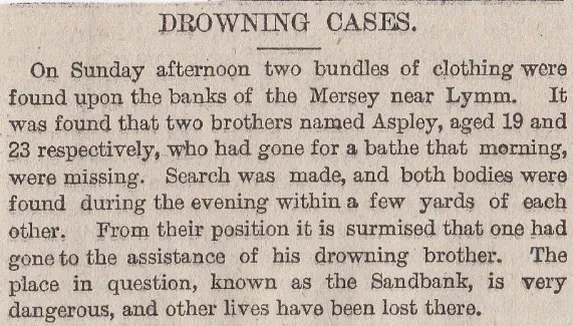
28/ Chelford Railway Station Suicide, February 1899
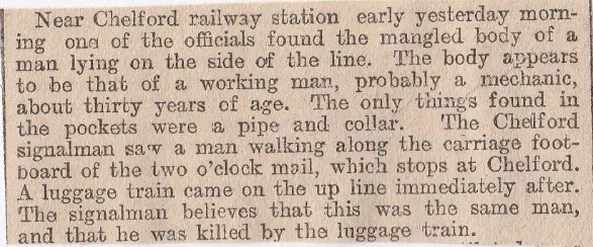
29/ Wilmslow, September 1844 (Death by Corset?)
One Sunday morning at Wilmslow church as the service was due to begin Jane Goodwin, aged twenty-two sat down near the pulpit. Soon after she felt unwell and was taken out the church to the sexton’s house which was nearby. It was all in vain as Goodwin was dead before they got there. The cause of her death was because her corset was too tight!
30/ River Dane/Northwich, March 1899 (Suicide)
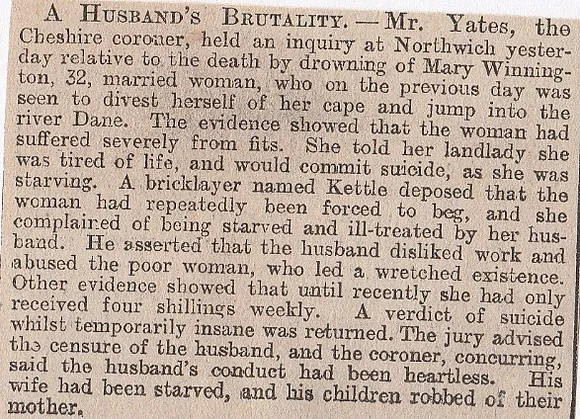
31/ Winsford, May 1899 (Fatal Accident)

32/ Neston, December 1903
Two burly chaps started arguing about politics, this escalated into a full-blown fight. Henry Pritchard, aged 28, and Ernest Grundy aged twenty-five punched each other and Pritchard ended up with a black eye. They went their separate ways but a few days later the eye had to have medical attention. An operation was performed but Pritchard died when he fell unconscious. Grundy, on hearing of the death of Pritchard, thought he’d be tried for manslaughter so he slit his throat.
33/ Crewe, (Mystery Death) January 1885
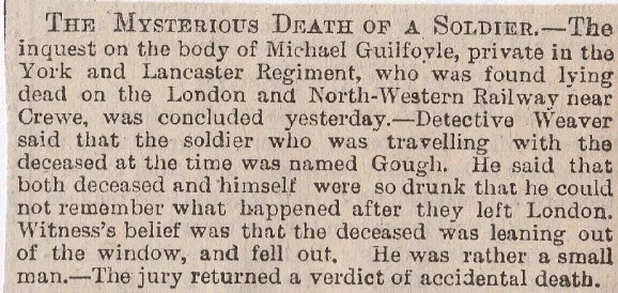
34/ Betley Mere near Crewe, (Two Drowned) January 1885
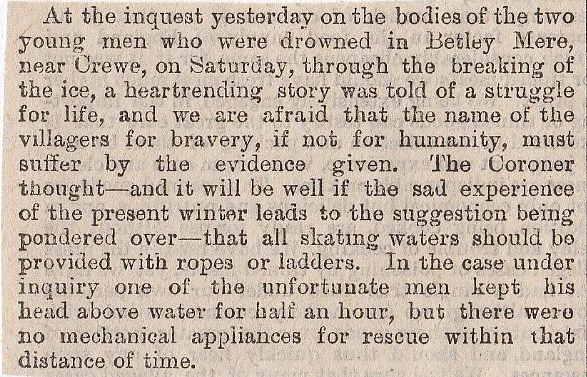
35/ Chester Castle Suicide, May 1858
The strange thing about this story is that the young lad of twelve was a prisoner at the Castle. Thomas Little of Seacombe, who was one of thirteen in the family, was told off by his father for some tiny misdemeanour and stayed out till the next day. When he did come back he was arrested by police for stealing three bottles of wine and a writing desk. The guilty verdict was passed and he got three weeks in Chester Castle for his troubles. While in prison he was in deep distress and cried incessantly and begged to be let out. Next morning he had a seizure (Epilepsy?) which he used to have anyway and again begged prison staff to free him. At dinner time he ate his bread and water then later was visited by the deputy-governor but had apparently calmed down. Staff left him alone thinking he was OK, but when an officer turned up at six o’clock with his tea, they found him hanging from a hook on the wall. The lad had tied his handkerchief to it and popped his head through the home-made noose. The staff had left a slate, on which he’d written about how he missed his mother urging them to visit as soon as possible and telling his siblings to be good to their parents. His last words were: “Take me home, and make me a coffin”.
36/ Nantwich Shooting, February 13th, 1899
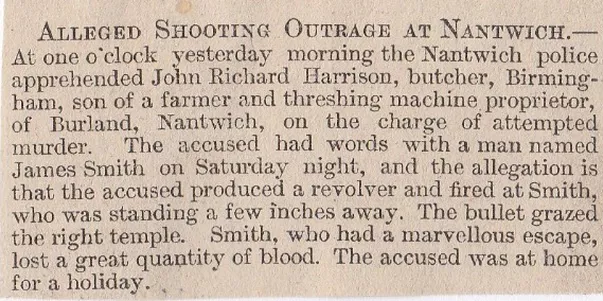
Nantwich Shooting, February 17th, 1899
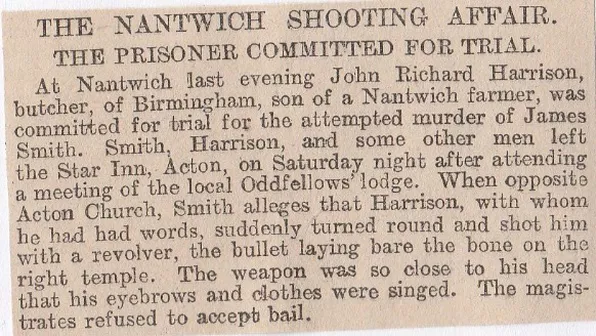
Nantwich Shooting, March 8th, 1899 ( Chester Winter Assizes )
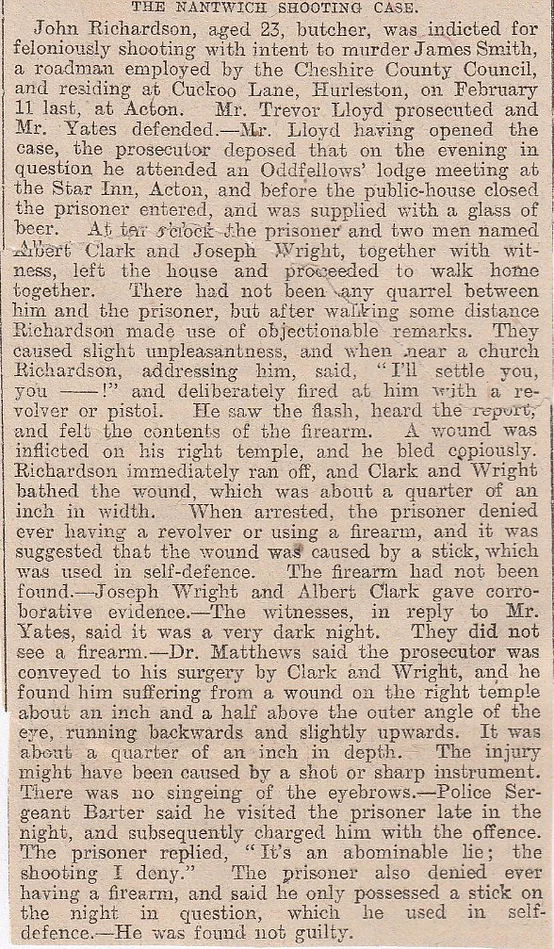
37/ Winsford, (Poacher Deaths) October 1858
A fatal accident happened to a couple of poachers on the London and North Western Railway near Winsford. They were in a gang of a dozen or so, armed with nets, traps and rifles. On their way back they tried to get across the line before the six o’clock coal train and two of them didn’t quite make it. One of them was Foster, who had a leg cut off and an arm dislocated while being knocked down. He died of his injuries later on. The other, Bennion, a widower with kids was hit with the full force of the train and his nose was the only part of his upper body not mutilated by the impact.
38/ Lawton Lake near Alsager, January 1885
One afternoon Arthur Thompson, a young married man, while skating on the ice at Lawton Lake near Alsager, broke through the ice and disappeared. The water was sixteen feet deep and his body was not recovered for about two hours.
39/ Warrington, April 1885
One Saturday afternoon a boy of five years of age, son of Mr Stephen Johns on, a herbalist of Napier Street in Warrington, fell into a ditch and was drowned before assistance arrived.
40/ Chester Murder, February 1885
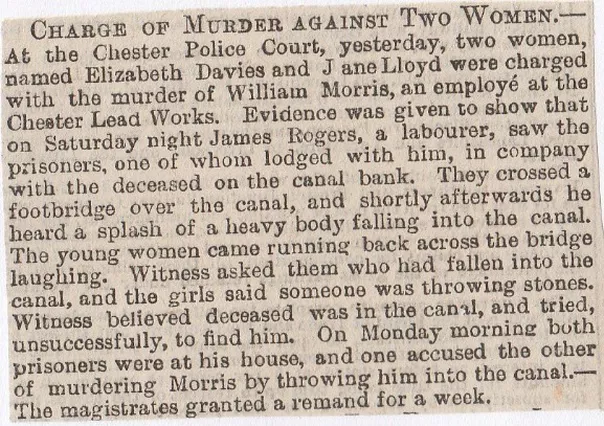
Chester, March 1885 (See Above)
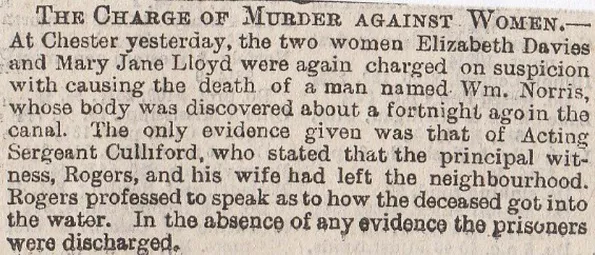
41/ Shropshire Union Canal Fatality, September 1885
A shocking affair has occurred on the Shropshire Union Canal. Two boats were passing between Chester and Ellesmere Port, when a boy named Owen Owen(?), son of one of the boatmen, put his head out of the cabin just as another boat approached. The latter struck him full on the forehead smashing his skull and causing instant death.
42/ Shropshire Union Canal, November 1885
The body of a well-dressed young man, about twenty-three years old has been found in the Shropshire Union Canal at Beeston. He was fair and had a light moustache. Not the slightest clue to identification has been obtained.
43/ Widnes, May 1899 (Railway Fatality)
About two o’clock yesterday afternoon a fatal accident occurred at Widnes to a woman named Mary Glynn of Water Street. She was crossing the railway line on the canal bank, Widnes when she was run over by an engine. Her head, arms and legs were cut off. The driver tried to stop before reaching her but failed.
44/ Winsford, (Pneumonia Deaths) December 1885
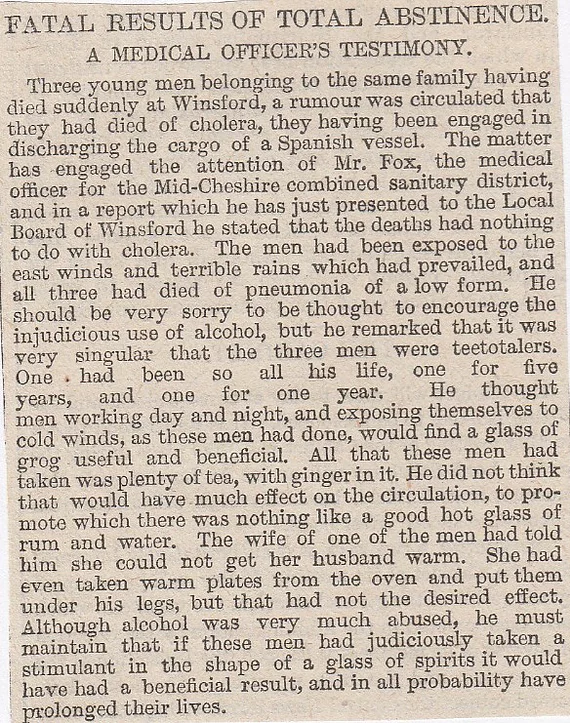
45/ Capesthorne near Macclesfield, (Cycling Fatality) June 1899
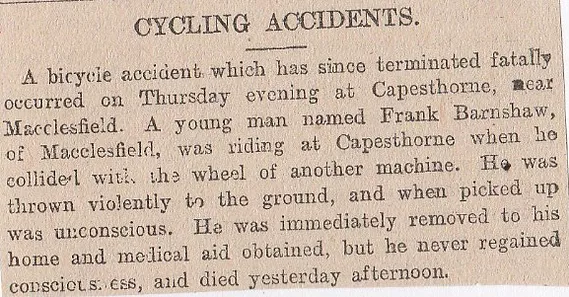
46/ Hamer Green near Nantwich, September 1910 (Summerhouse Mystery)
At a farm at Hamer Green near Nantwich, the sound of gunshots alerted Mr Edwards, a farmer, that something was amiss. A search soon discovered that his daughter, Miss Emma Edwards, who was twenty-six, had been shot in the summerhouse. The scene led them to think it was self-inflicted because the muzzle was found on her lap pointing towards her chest. She lingered a while then died a few hours later.
47/ Sutton Drowning, January 1885
Edward William Clemo, son of Peter Clemo, a Warrington engine driver, was drowned in a pit at Sutton. The boy was visiting his grandfather, who warned him not to venture on the ice. As he was absent from the house longer than usual a search was made. Near a hole in the centre of the ice on the pit, the boy’s cap was found and afterwards, his body was recovered from the water.
48/ Shropshire Union Canal Murder, December 1889
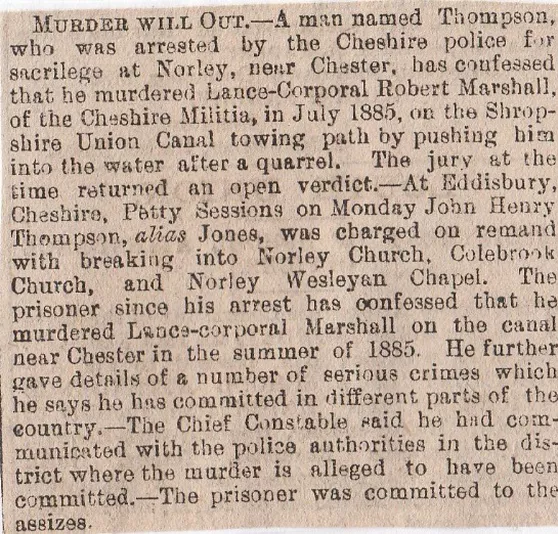
49/ Bridgewater Canal Drowning, Runcorn, June 1899
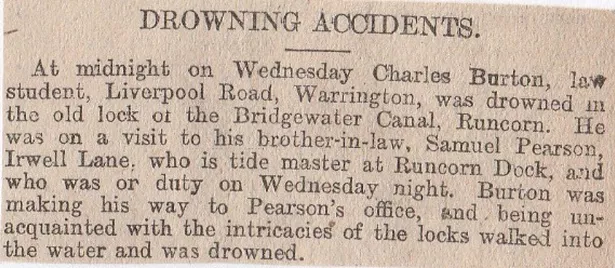
50/ Bulls Head Inn Suicide, Chester, April 1861
An old gentleman killed himself at the Bulls Head Inn, Chester, by shooting himself in the mouth. He arrived in Chester on the two o’clock train from Birkenhead and called at the inn for a swift drink. He ordered a drink went into the yard, then the shot was heard. Landlord and patrons rushed to the yard and found him in a leaning position with blood trickling from his ears and chin. A doctor came from nearby but pronounced him dead.
In his pocket was a letter addressed to “Mr J.Darnell, Mrs Amos, Prospect Vale, Fairfield, Liverpool or Tax Office, Custom House, Liverpool”. He also had an umbrella with an inscription on the handle which was identical to the address mentioned.
51/ Plumbley Station Fatality, June 1899
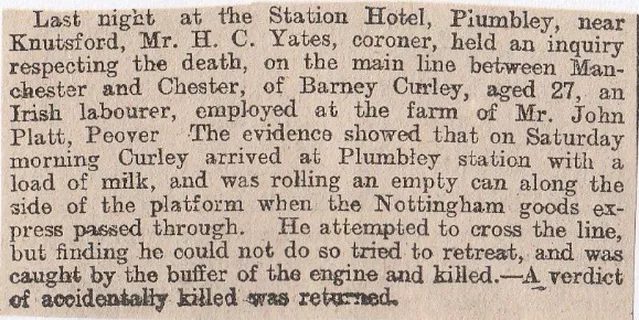
52/ River Dee, Chester, May 1885
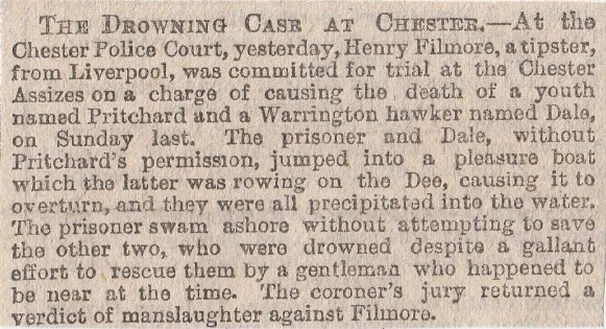
53/ Wybunbury near Nantwich, June 1894 (Strangled on a Swing)
A sixteen-month-old child, son of a florist named Aulbury, fell asleep on a swing rope which was hanging from a tree in their garden. About ten minutes later the child was found strangled due to it falling off the swing and the rope becoming entangled around its neck.
54/ Macclesfield Abortion, March 1899
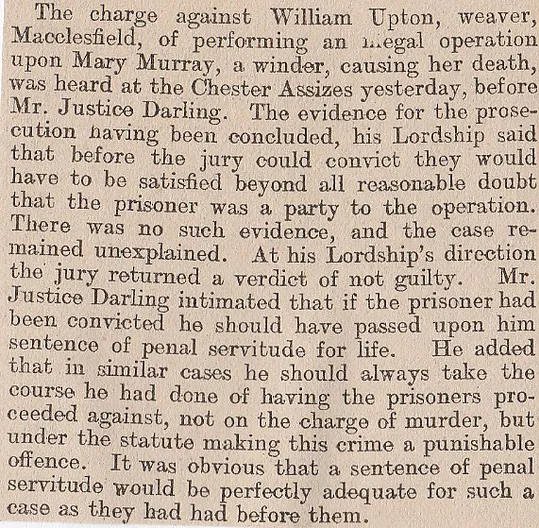
55/ Chester Workhouse Brutality, December 1885
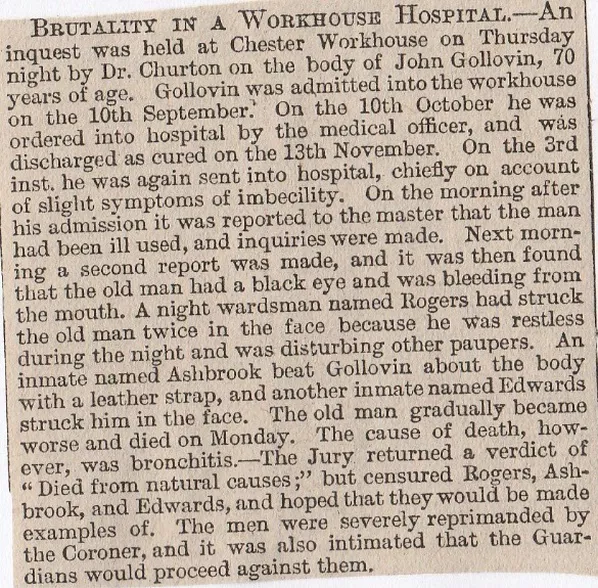
56/ Weston Point near Runcorn, April 1894
The body of an unknown boy was found in the Manchester Ship Canal at Weston Point by the harbour-master William Hough when he saw him floating on the surface. There wasn’t a lot of flesh on the corpse and judging by the look of it, had been in the water at least 3 months. Only the skull was left, the hands were cut off, and the legs cut off below the knees. The coroner found out he was around eight to twelve years of age, had a jacket on, vest, trousers in tweed, grey socks and brand new boots, with a merino jersey on as well. He lies at the Weaver Hotel awaiting identification.
57/ Manchester Ship Canal, Runcorn, January 1896
The captain of a steam tug, the “Wigan”, named Harry Smitham, went to look over the stern of the boat when he fell over the side. He then got caught in the propeller and drowned.
58/ Weston Point Fatality, February 1899
A woman named Mrs Leach was crossing the railway line which connects the Weston stone quarries with the Ship Canal when she was knocked down by some passing waggons and was killed instantly.
59/ Pickmere, Northwich, June 1899
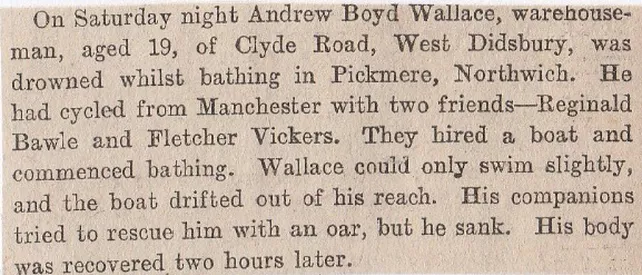
60/ Congleton Fatal Accident, December 1900
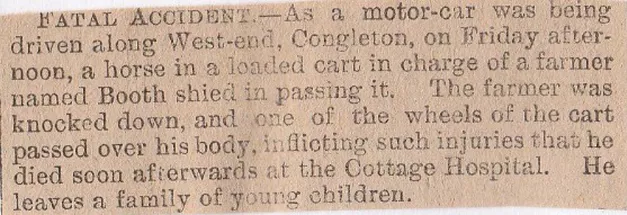
61/ Northgate Suicide, Chester, March 1899
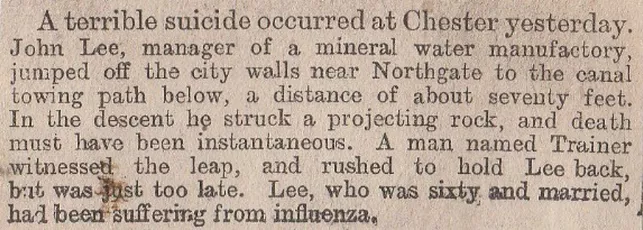
62/ Between Crewe and Sandbach, (Holmes Chapel) November 1903
The body of a woman dressed as a nurse was found on the London and North Western Railway line in between Sandbach and Crewe. She was taken to the railway’s hospital at Crewe and identified as Nurse Hodkinson of Uttoxeter, and she had worked out her suicide for quite a while. She threw herself from the Crewe to Manchester train, and her suicide note was found in her pocket. Written while at the Euston Hotel in London, she wrote the following:-
“Sir-Just a line to let you know I am taking my own life. I am not mad, only strange at times, but that is nothing, so you must do what you like to dispose of my body. Be as kind as you can with my mother and relatives. I have sent them all word, and I hope they will all soon forget me, but when you are ill and no money you don’t like to sponge on your people or relations, although they have all been so kind in coming forward to help me in my –. But I cannot go in for it; fancy six months. I was one for work, and I have always been so strong- Believe me to remain, yours sincerely-NURSE S.HODKINSON”. -When examined at the hospital, a plaster was found over her heart, and on being taken away, a photo of a man was under it. She died the day after the suicide attempt. She leapt from the train at Holmes Chapel receiving awful injuries, while on the London to Buxton train.
63/ Ince, February 1899
Richard Macdonald of Wigan was going to work when, owing to a thick fog he missed his way and fell into the Leeds and Liverpool Canal at Ince and was drowned. He was a collier and was 30 years of age.
64/ Holmes Chapel Fatality, September 1885
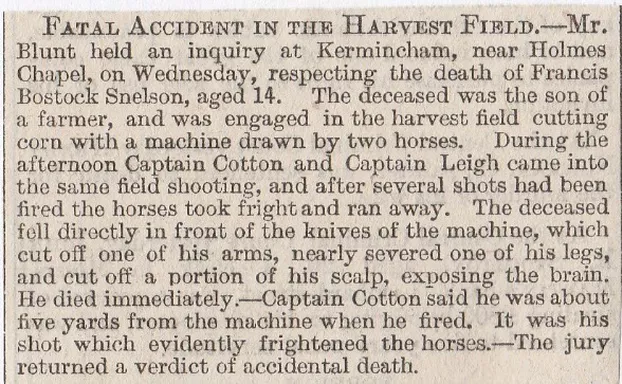
65/ Kingsley (Pitchfork Death) September 1885
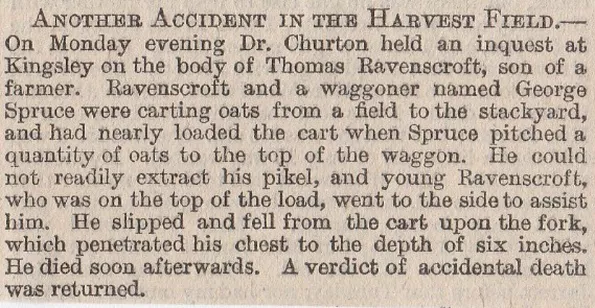
66/ Shurlach, (Drowned in a Well) August 1885
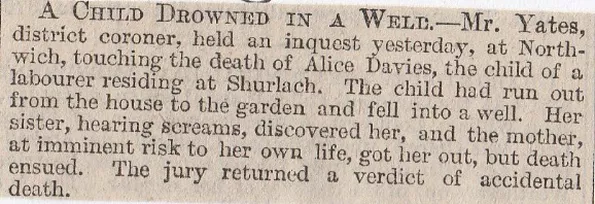
67/ Sanghall near Chester, November 1883 (Man Found Hanging)
Robert Jackson, sixty-seven years of age, was found by a shooting party in Sanghall hanging from a tree. The corpse was in a dreadful state of decomposition and it was discovered later that he’d been missing for three or four weeks. He hung himself from a tree after making his way here from his home-town of Chester. “Suicide while of unsound mind” was the verdict.
68/ Balderton Station (Body Found) August 1901
J.R.Martin, the station-master at Balderton Station, was just checking the place over after the 11-15 a.m.train from Chester had gone through when he observed a body lying on the line. The wicket gates were closed at the time but the body is supposed to be that of a Welshman named Joseph Griffiths, a pedlar from Flintshire.
69/ Bridgewater Canal Murder, Thelwall, April 1885
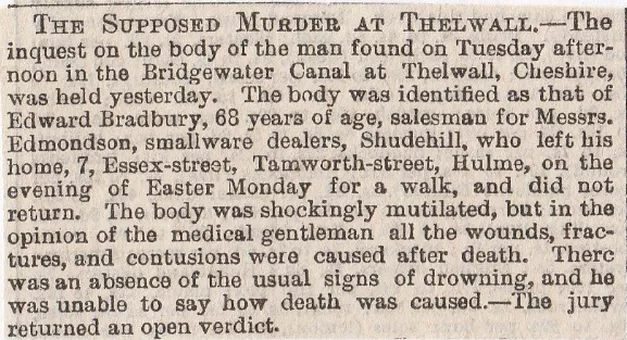
70/ Marston near Northwich February 1899
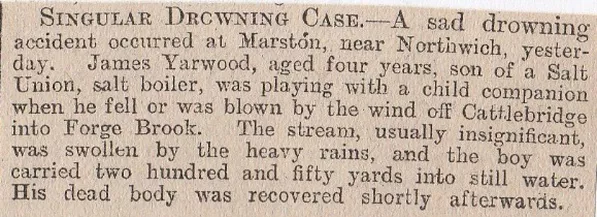
71/ Adlington near Macclesfield, March 1900
A farmer in Adlington was going over his land when he saw a man hanging in a tree. He was hanging from the strap on his portmanteau (travelling bag), which itself was nearby and the branches had been trimmed away. The body itself is a man of forty-five, about 5 foot 3 inches, medium build and brown hair. The bag was full of clothing and pawn tickets for a watch and portmanteau were on the body. An address book had the name “Fr.Preime, c/o Mrs Pollard, Northland View, Northgate, Pontefract”.
72/ Orford Barracks Suicide, Warrington, July 1885
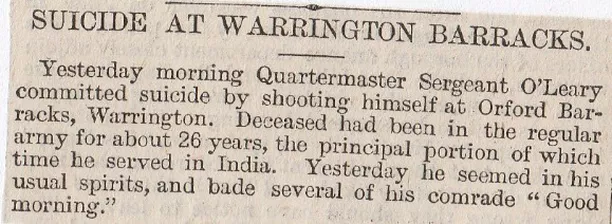
73/ Alpraham Suicide, February 1889
William Williams, a shoemaker, committed suicide by hanging himself. Here could be the reason! Williams married a widow with sixteen kids and when he left her he started drinking like a fish. The Coroner summed up “If there was any one thing more than another which proved his insanity, it was marrying a woman with sixteen children”.
74/ Alsager Gun Accident, June 1899
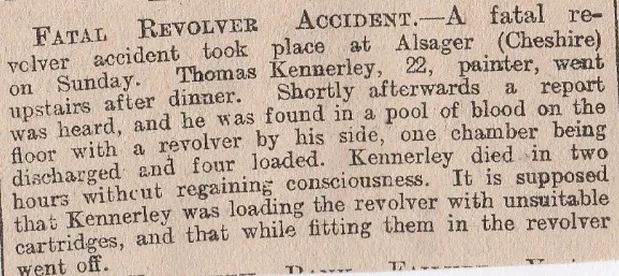
75/ Bowling Green Bank, Chester, January 1890 (Weird Suicide)
Residents of Bowling Green Bank, Chester, saw a black flag hanging out of number 5’s window. Thinking it strange behaviour they got hold of the police, and Sergeant Gallagher and Det. Keegan went to see the owner, Mr Crawford. He answered their questions very calmly saying everything was all right. The next morning, however, the same scene was re-enacted, neighbours worried, police turn up etc. This time he didn’t answer the door so they broke in and there on the bed was old man Crawford. He was immaculately dressed, with a suit, collar and tie on. On a slate, he’d written that he wanted to die and was to be buried in the garb he was wearing. He swallowed some Battle’s Vermin Killer.
76/ Bank Quay Railway Station, Warrington, August 1885
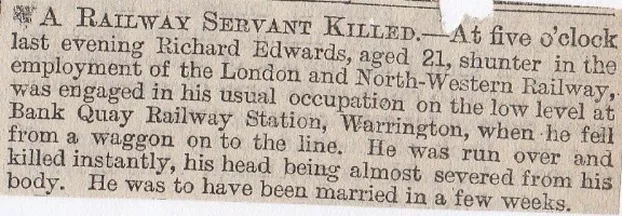
77/ Runcorn Suicide, September 1881
John Sutton, a forty-year-old blacksmith, who lived in Nelson Street with his wife and seven children, killed himself. A neighbour heard an explosion at two p.m., coming from next door. She ran to get his wife and when they got to the bedroom they found Sutton on the bed with half his head missing. Police inquiries discovered information that he’d bought some powder at an ironmonger’s, made up into a bag, popped it in his mouth and lit it. Sutton had been depressed as of late and had no work for a year and this caused ructions in the Sutton household. When they pawned something, he spent the money getting drunk.
78/ Cholmondeley Park (Riding Death) near Malpas, April 1899 (Still there)
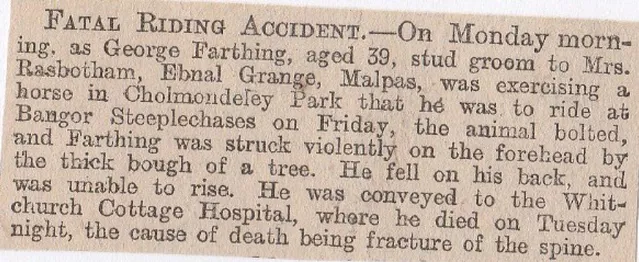
79/ Chester March 1905 (22 or 25 Children)
This is unbelievable in today’s world! The body of nine-month-old Nellie Higginson, who was the 23rd child (yes, 23rd) of Thomas and Emma Higginson. Only eight were now alive. Emma had started to drink heavily and she’d neglected the children, all being filthy and partially starving. When asked by court officials how many children she had said “About 22 or 25”. The verdict of “Manslaughter” was returned.
80/ Moore near Warrington, (Kitchen-Maid Suicide) December 1885
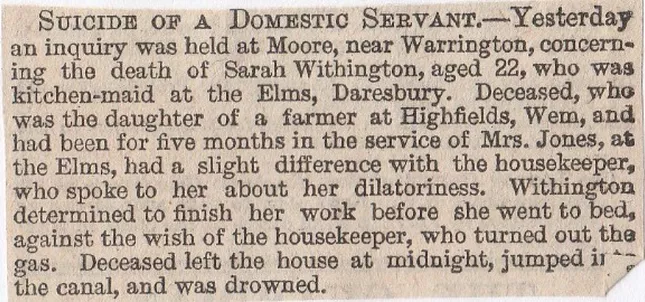
81/ Handforth (Horrific Death) June 1901
This is enough to put you off cycling forever! A solicitor from Ashton-under Lyne, Mr Fish, was out for bike ride with mates and was overtaking “a conveyance” but he didn’t spot the cart heading towards him. The shaft of the cart went straight through his body, and to make matters worse, the horse became scared and bolted off with Fish stuck to the cart. It went a couple of hundred yards before it was stopped. He died the next day.
82/ Chester, September 1883 (Suicide in Tobacconists)
The son of a Cheshire farmer, name unknown, went into Mr Noblett’s tobacconists at Chester and informed him “I am going to poison myself”, then taking a swig of carbolic acid. Mr Noblett managed to wrangle the bottle from him but he ran off. Shortly after this episode he went into the Old Queen’s Head Inn and ordered a beer. He again pulled out the acid bottle poured it in and drank in full view of everyone. The man died within a few minutes. (Who was he?)
83/ Nantwich Child Murder, March 1899
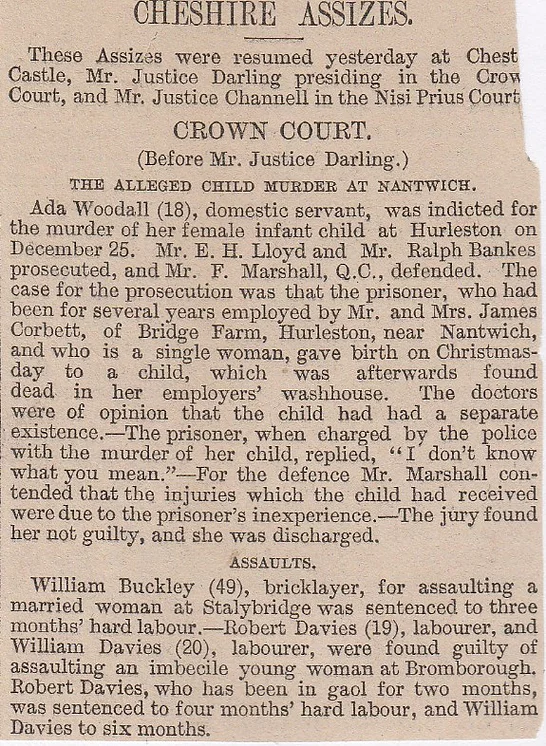
84/ St Paul’s Churchyard, Macclesfield, January 1856 (Fatal Accident)
A near-fatal accident occurred in the churchyard at St Paul’s in Macclesfield. John Ridgway, the sexton, was asked to prepare a grave, and this he did. He decided to take out a brace which held in the earth, this caused a mini-landslide and he was buried. People nearby managed to dig him out after a number of hours but he was alive. So there’s a happy ending you may think, but the coincidence of the year had just happened. In the month of May in 1855 his brother, Joseph Ridgway, died under the exact same circumstances. He was ordered to dig an eleven-foot deep grave (Seems very deep to me). He took away a brace holding it all in, and he was buried alive. It was because he died that his brother got the sexton’s job!
84/ Macclesfield Murder, December 1876
Before the magistrates at Macclesfield, Robert Halliwell, rope manufacturer, Bollington and Macclesfield, was charged with the murder of his son Robert, thirteen-years-old. The prisoner has for several months past been in a desponding state frequently expressing that he and his family would die in poverty. Acting on medical advice his family had him removed to an institution at Matlock. One night, he and his wife went to bed, the son slept in the same room. Mrs Halliwell got up at 7-30 leaving father and son alone in the room. Half an hour later he came downstairs and said: “I’ve killed our Robert”. She went to see him. He’d been strangled with the neck being discoloured and bearing finger marks. When questioned afterwards he said he’d done it on impulse and thought he’d put the lad out of his misery. A doctor examined him and said he was clearly insane.
85/ Hutchinson’s Works, Widnes, (Two Dead)August 1892
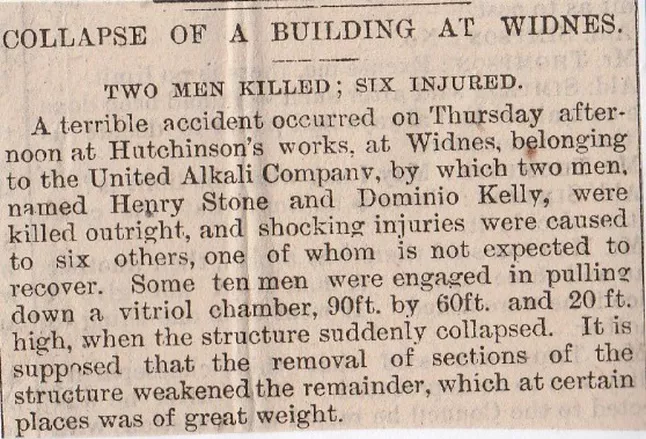
86/ Widnes Huband Impersonation, January 1st, 1916 (Lincs Standard)
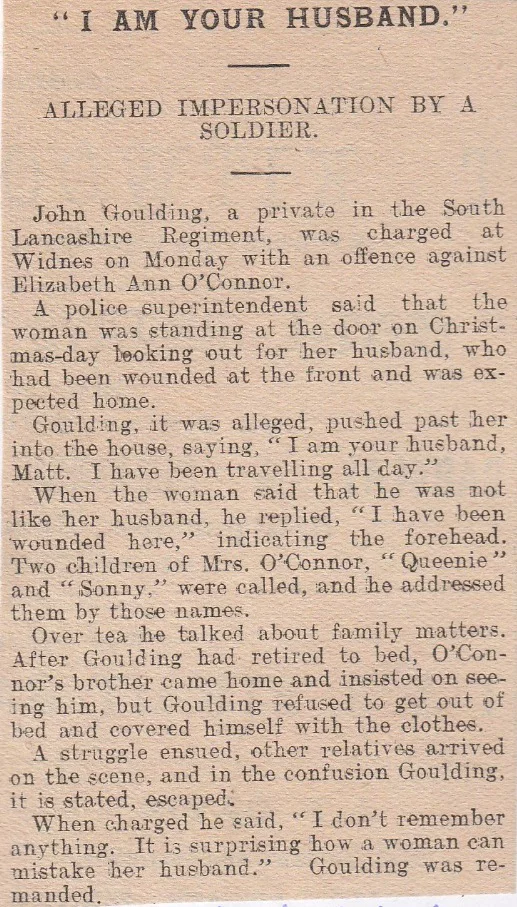
87/ Widnes, January 1st, 1916 (N.Lincs Advertiser)
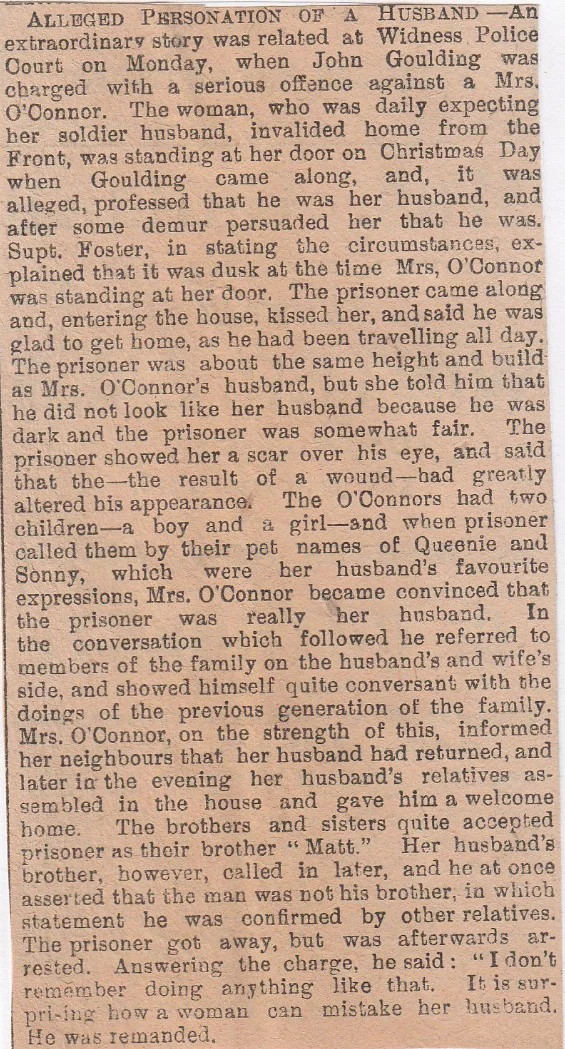
88/ Tilston near Tarporley (Ice Skating Death) December 1885
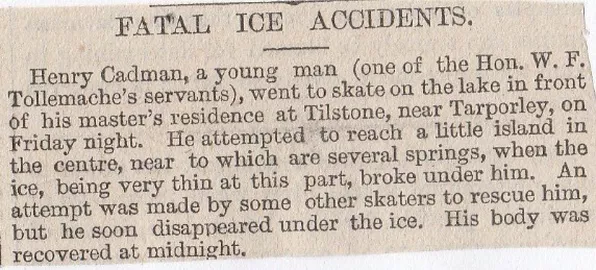
89/ Macclesfield Cemetery Suicide, August 1892
Two lads named Birchenough and Siddall were walking through Macclesfield Cemetery when they found the body of a young man. They told police they found him in some bushes by the pond side and it appeared from the injuries he had shot himself in the mouth. The identity of the body was 26-year-old Frank Nosworthy, an actor, who was not very punctual and had to take chlorodyne to sleep properly. A letter addressed to “Mr F.H.Graham, manager of the Dead Letter Company, was found on him and it said that he had felt compelled to commit suicide and he felt his old complaint of his eyesight fading while he was on stage performing the previous night. He further added that it would be impossible for him to carry on due to his eyesight, also saying he was tired of life. He thanked Mr Graham for all his kindness and told him to give his regards “to all the boys and girls at the Theatre”.
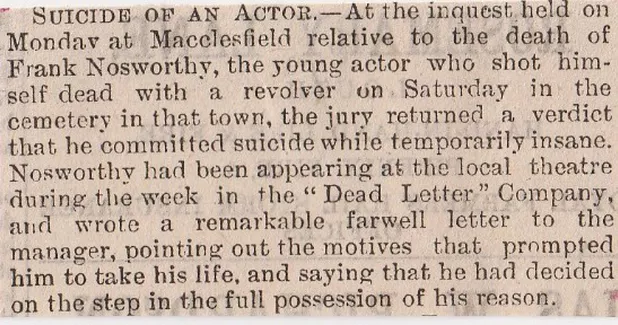
90/ Cheshire County Lunatic Asylum, (Murder) October 1903
James Peacock was an elderly inmate at the Cheshire County Lunatic Asylum, who was suffering from paralysis and lived in a single room on his own. An attendant found the door closed, so he entered and found a fellow inmate Prettyman getting undressed and getting into Peacock’s bed. There was no sign of Peacock but there were bloodstains near the bed. When the attendant asked him where Peacock was, he said “I have done for him”- meaning that he had murdered him. Peacock was found in the toilets with various bruises on his face and head and as a result of complications from wounds received he died from pneumonia. Prettyman has also died from natural causes since the attack.
91/ North-Western Hotel Suicide, Crewe, June 1899
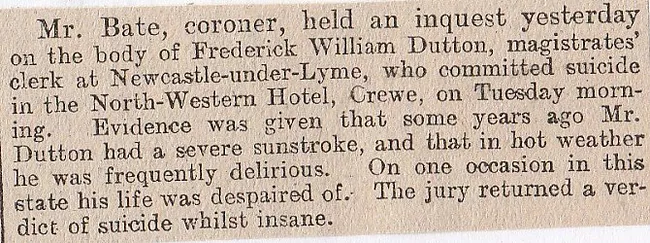
92/ Northwich, (Labourer Killed) December 1885
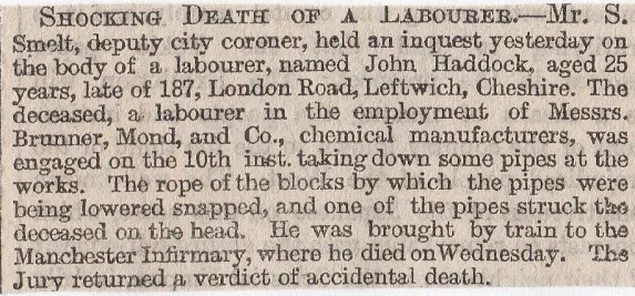
93/ Badger’s Lake Deaths, near Puddington Hall, March 1888 (Badger’s Rake Lane is off the A 540)
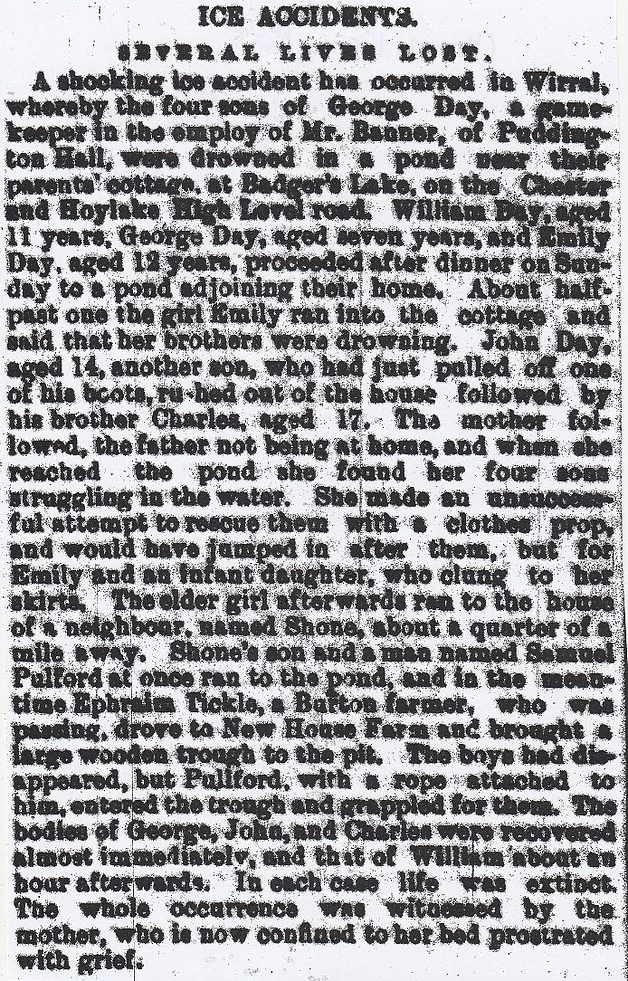
94/ Yew Tree Farm, North Rode, (Fatal Fire) July 1870
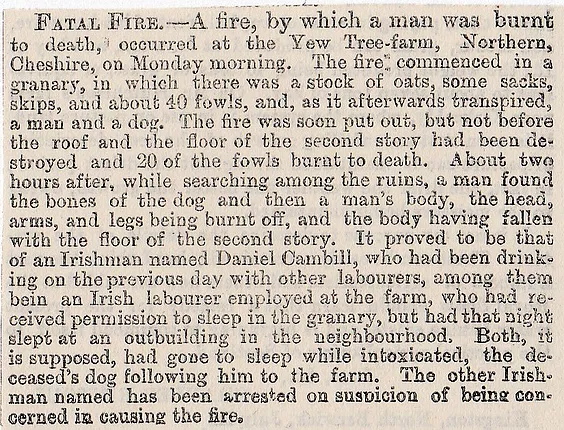
95/ Great Sankey Murder, November 11th 1870.
November 24th, 1870
December 23rd 1870
The Warrington Guardian states that James Halloran and Patrick McGrath were charged yesterday before the magistrates with being implicated in the murder of John Forrest at Sankey, Cheshire, last month. A witness swore that McGrath was asleep at his stepfather’s house when the murder was committed, and a clear alibi was established for Halloran. At the conclusion of the case, however, in consequence of other evidence against the prisoners, they were committed for trial.
96/ Execution at Chester Gaol (Samuel Griffiths) April 1866
97/ Drowning at Parkgate, October 1866
98/ Fatal Fight at Neston, December 23rd, 1903.
At Neston, Cheshire, Henry Pritchard, joiner, twenty-eight, and Ernest Grundy, a twenty-five-year-old bricklayer, a week ago entered into a political discussion, which led to a fight. Pritchard sustained an injury to his eye. An operation was performed, but he died last evening. Grundy, upon hearing of his death, cut his throat with a razor, almost severing his head from the body. Both were unmarried.
December 25th, 1903 (The Inquests)
99/ Fatal Railway Collision at Chester Station, January 1st, 1904.
100/ Drowning in the Shropshire Union Canal, Croughton. December 1906
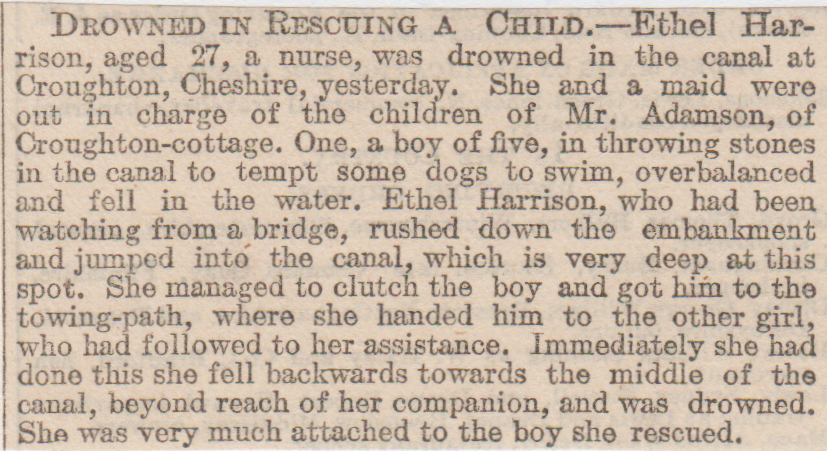
101/ Bradeley Hall Murder, Haslington. March 16th, 1907 (Near Crewe, on Bradeley Hall Road)
Saturday, July 27th 1907 (Crewe Murderer Reprieved)
The Home Secretary has reprieved Thomas William Parrett, a youth of sixteen, who was sentenced to death at Chester Assizes for murdering Albert Birtles, a fellow farm servant at Bradeley Hall Farm, near Crewe. The sentence has been commuted to one of penal servitude for life. It will be remembered that Parrett riddled Birtles with shot, dragged the body to a brook, and subsequently buried it in an orchard.
102/ Murder at Church Lawton, near Crewe. July 1907
103/ Child Murder at Audlem. December 1880
104/ Young Lads Drowned at Warrington. December 1880
On Saturday three youths named Thomas J. Wilkinson, a clerk at the Mersey Mills, James Ashley, fifteen, and William Hurst, twenty, were drowned in the Mersey at Warrington. They were in a boat below the Latchford Weir, and were trying who could pull nearest to it. The boat went under the weir and began to fill with water, then it sank immediately. Hurst was the only one who could swim, and he caught one of his companions by the hand, but, feeling he was being pulled under, let him go and reached the side in an exhausted condition. The body of Wilkinson was found yesterday morning.
